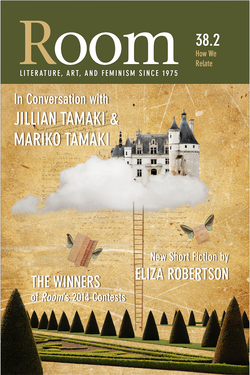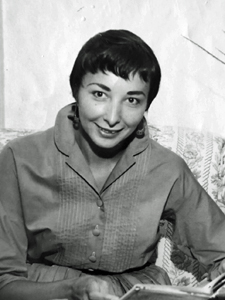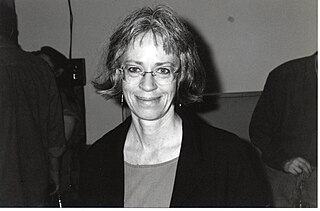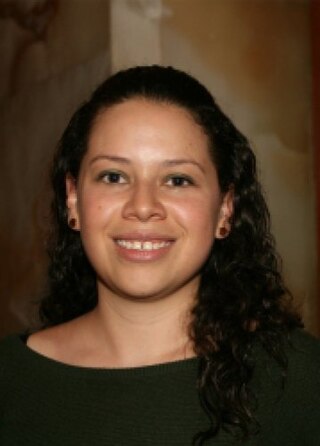Daphne Marlatt, born Buckle, CM (born July 11, 1942 in Melbourne, Australia), is a Canadian poet and novelist who lives in Vancouver, British Columbia. [1]
At a young age, her family moved to Malaysia and at age nine, they moved to British Columbia, where she later attended the University of British Columbia. There she developed her poetry style and her strong feminist views. In 1968, she received an MA in comparative literature from Indiana University.
Her poetry, while considered extremely dense and difficult,[ by whom? ] is also much acclaimed. In 2006, she was made a Member of the Order of Canada.
Daphne Marlatt is an author, teacher, writer, editor, mother and feminist. Her works include two novels, several poetry pieces, and many edited literary journals and magazines. Daphne Marlatt was born to English parents, Arthur and Edrys Lupprian Buckle, in Melbourne, Australia on July 11, 1942. [2] [3]
At the age of three, Marlatt's family moved to Penang, Malaysia and then at the age of nine her family immigrated to Vancouver. Marlatt received her B.A. from the University of British Columbia in 1964 and while there, in 1963, became an editor for TISH, a Canadian literary journal.
After traveling around the continent with her husband, Gordon Alan Marlatt, a clinical psychologist, she then settled down for a while in Bloomington, Indiana where she received her M.A. from the Indiana University in Comparative literature in 1968. It is here where she started to write Frames of a Story (1968). Robert Lecker, in the 1978 article "Perceiving It as It Stands" from Canadian Literature , says "Marlatt has every right to join Kay and Gerda in flight, for their predicament, and the development of their story, serve as a metaphor for the problems of growth encountered by a poet struggling to break away from the frames imposed by established word patterns and the falsities implied by a world view which categorizes experience, storytelling it in standardized form, as if the motion of living was always the same, always sane."
In 1969, Marlatt published leaf leaf/s, which is a collection of shorter poems. In 1971, Marlatt published Rings, a collection of poems about pregnancy, birth, and early parenting. She started teaching writing and literature at Capilano College and also edited for The Capilano Review . In 1972 she published Vancouver Poems. Marlatt published a well known piece of hers, Steveston, in 1974. This piece is about a small fishing village that Marlatt explains the relation to its history as a camp for Japanese Canadians during World War II.
In 1975, Marlatt published Our Lives, a poetry piece about "organic implosions of relationships", according to BookRags. Marlatt and her partner, the poet and artist Roy Kiyooka, separated in the late 1970s. In 1977, The Story, She Said was published and so was her book, Zocalo. Zocalo is a collection of long poems about the travels had through the Yucatán. Marlatt's, What Matters: Writing 1968-1970, includes some of her early writings, including "Rings," and was published in 1980.
Also, in 1980 she had, Net Work: Selected Writing, published, which contains new "confidence and authority", according to Fred Wah, a professor at the University of Calgary. He goes on to say that "the flow of town and history, of the Japanese people and the cannery, especially of the river and language, are more securely rooted in place and concentrated in the writing consciousness than in any other of her books." And according to www.athabascau.ca, Net Work: Selected Writing is "a selection of poetry spanning from Frames of a Story (1968) to What Matters (1980) is an excellent cross-section of her early poetry." It is through these pieces and earlier pieces that Marlatt's feminist theory begins to emerge.
In 1977, Marlatt co-founded periodies: a magazine of prose (1977–81) and in 1981 published here & there. It was around this time that Marlatt became more involved in feminist concerns, and attended and organized several feminist conferences. She also, in 1985, co-founded Tessera, which is a feminist journal. Around this time, Marlatt is quoted to saying, "a time of transition for me as i tried to integrate my feminist reading with a largely male-mentored postmodernist poetic, at the same time coming out as a lesbian in my life as well as in my writing."
In 1983, Marlatt's How Hug a Stone was published, which follows that journey traveled by herself and her son, in 1981, to England. In 1984, Touch to My Tongue was published. Both pieces "express her intense apprehension of the continually changing world.", according to Douglas Barbour, an author of The Canadian Encyclopedia .
Marlatt created two books, Mauve, published in 1985 and character/jeu de letters, published in 1986, with Quebec feminist and writer Nicole Brossard. Double negative, a piece that was put together between Marlatt and Betsy Warland, her significant other, was published in 1988.
In 1988, the introduction of one of Marlatt's most distinguished pieces, Ana Historic, was published. This novel, according to www.athabascau.ca, " describes the experiences of women both historic and contemporary." Marlatt describes her novel, Ana Historic, in a 2003 interview with Sue Kossew, a professor at the University of New South Wales, as follows: "I like rubbing the edges of document and memory/fiction against one another. I like the friction that is produced between the stark reporting of document, the pseudo-factual language of journalism, and the more emotional, even poetic, language of memory. That's why I used such a hodgepodge of sources in Ana Historic: a little nineteenth-century and very local journalism that sounds like a gossip column, a 1906 school textbook, various historical accounts, some contemporary feminist theory, and a school teacher's diary from 1873 that was completely fictitious."
According to Caroline Rosenthal, author of Narrative Deconstructions of Gender in Works by Audrey Thomas, Daphne Marlatt, and Louise Erdrich, "Marlatt, in Ana Historic, challenges the regulatory fiction of heterosexuality. She offers her protagonist a way out into a new order that breaks with the law of the father, creating a "monstrous" text that explores the possibilities of a lesbian identity."
In 1991, Marlatt's piece, Salvage, was published, which explores parts of Marlatt's life and puts it together with a feminist's point of view. In 1993 Ghost Works was published, which contains prose poems, letters, diary entries, short-line poems, and travel books to make a narrative.
In 1994, Two Women in a Birth, was published. This piece was written by both Marlatt and her significant other, Betsy Warland. This piece is "This collection of [poetry] represents ten years of collaborative work by two of Canada's leading feminist writers" according to books.google.com.
In 1996, Marlatt's second novel, Taken was published. This novel that is a tribute to women whose lives have been taken by war. In 2001, This Tremor Love Is was published. This Tremor Love is a collection of love poems over a period of twenty-five years, from Marlatt's first writing to her most recent. Marlatt's recent published piece, a collection of poetry called Seven Glass Bowls, was published in 2003.
In addition to all of Marlatt's published works she can be heard on the CD Like Light Off Water, Otter Bay, 2008, reading passages from her classic poetry cycle, Steveston. With music by Canadian composers Robert Minden and Carla Hallett, the CD offers a delicate resonance of microtonal nuance and lyrical intimacy surrounding Marlatt¹s poetic voicing, rhythm and imagery. In 2006 Marlett and her work were the subject of an episode of the television series Heart of a Poet produced by Canadian filmmaker Maureen Judge.
Marlatt has also taught at several colleges and universities. These include: University of Alberta, University of British Columbia, Capilano College, University of Calgary, University of Manitoba, McMaster University, Mount Royal College, University of Saskatchewan, Simon Fraser University, University of Victoria and University of Western Ontario. She also received four awards in her career. She received the MacMillan and Brissenden for creative writing; the Canada Council award; the Vancouver Mayor's Arts Award for Literary Arts; and the Order of Canada for her contributions to Canadian literature. Marlatt also founded the West Coast Women and Words Society.
Marlatt is currently[ when? ] a student of the Gelug school of Tibetan Buddhism, and currently lives in Vancouver, B.C.
Canadian poetry is poetry of or typical of Canada. The term encompasses poetry written in Canada or by Canadian people in the official languages of English and French, and an increasingly prominent body of work in both other European and Indigenous languages.

Nicole Brossard is a French-Canadian formalist poet and novelist. Her work is known for exploration of feminist themes and for challenging masculine-oriented language and points of view in French literature.
Frankland Wilmot Davey, FRSC is a Canadian poet and scholar.
Smaro Kamboureli is a Canadian poet and scholar who currently is a professor of English at the University of Toronto, where she also sits as the Avie Bennett Chair in Canadian Literature. She previously taught English and was the Director of the TransCanada Institute at the University of Guelph.
Sky Lee is a Canadian artist and novelist. Lee has published both feminist fiction and non-fiction and identifies as lesbian.

Bobbi Lee Maracle was an Indigenous Canadian writer and academic of the Stó꞉lō nation. Born in North Vancouver, British Columbia, she left formal education after grade 8 to travel across North America, attending Simon Fraser University on her return to Canada. Her first book, an autobiography called Bobbi Lee: Indian Rebel, was published in 1975. She wrote fiction, non-fiction, and criticism and held various academic positions. Maracle's work focused on the lives of Indigenous people, particularly women, in contemporary North America. As an influential writer and speaker, Maracle fought for those oppressed by sexism, racism, and capitalist exploitation.

Room is a Canadian quarterly literary journal that features the work of emerging and established women and genderqueer writers and artists. Launched in Vancouver in 1975 by the West Coast Feminist Literary Magazine Society, or the Growing Room Collective, the journal has published an estimated 3,000 women, serving as an important launching pad for emerging writers. Room publishes short fiction, creative non-fiction, poetry, art, feature interviews, and features that promote dialogue between readers, writers and the collective, including "Roommate" and "The Back Room". Collective members are regular participants in literary and arts festivals in Greater Vancouver and Toronto.

Phyllis Webb was a Canadian poet and broadcaster.
TISH was a Canadian poetry newsletter founded by student-poets at the University of British Columbia in 1961. The publication was edited by a number of Vancouver poets until 1969. The newsletter's poetics were built on those of writers associated with North Carolina's Black Mountain College experiment.
Press Gang Publishing was a feminist printing and publishing collective active in Vancouver, British Columbia, Canada, between the early 1970s and 2002.

Margaret Christakos is a Canadian poet who lives in Toronto.
Betsy Warland is a Canadian feminist writer of over a dozen books of poetry, creative nonfiction, and lyrical prose. She is best known for her collection of essays, Breathing the Page: Reading the Act of Writing (2010).
The Capilano Review (TCR) is a Canadian tri-annual literary magazine located and published in Vancouver, British Columbia, Canada on the traditional, ancestral, and unceded territory of the xʷməθkʷəy̓əm (Musqueam), Sḵwx̱wú7mesh (Squamish), and səl̓ilwətaɁɬ (Tsleil-Waututh). A member of the Canadian Magazine Publishers Association, Magazine Association of BC, and the Alliance for Arts and Culture, it publishes avant-garde experimental poetry, visual art, interviews, and essays. The magazine features works by emerging and established Canadian and international writers and artists.
Carole Itter is a Canadian artist, writer, performer and filmmaker.
Gillian Jerome is a Canadian poet, essayist, editor, university instructor and high-school educator. She won the City of Vancouver Book Award in 2009 and the ReLit Award for Poetry in 2010. Jerome is a co-founder of Canadian Women In Literary Arts (CWILA), and also serves as the poetry editor for Geist. She is a lecturer in literature at the University of British Columbia and also runs writing workshops at the Post 750 in downtown Vancouver.
Juliane Okot Bitek, also known as Otoniya J. Okot Bitek, is a Kenyan-born Ugandan-raised diasporic writer and academic, who lives, studies and works in Vancouver, British Columbia, Canada. She is perhaps best-known for her poetry book 100 Days, a reflection on the 100-day 1994 Rwandan genocide, in which an estimated 800,000 Tutsi and Hutu people were killed. She has been a contributor to several anthologies, including in 2019 New Daughters of Africa: An International Anthology of Writing by Women of African Descent, edited by Margaret Busby.
Feminist poetry is inspired by, promotes, or elaborates on feminist principles and ideas. It might be written with the conscious aim of expressing feminist principles, although sometimes it is identified as feminist by critics in a later era. Some writers are thought to express feminist ideas even if the writer was not an active member of the political movement during their era. Many feminist movements, however, have embraced poetry as a vehicle for communicating with public audiences through anthologies, poetry collections, and public readings.
Robert Hogg was a Canadian poet, critic, professor, and organic farmer.

Judith Copithorne is a Canadian concrete and visual poet.

Karen Villeda is a Mexican writer, poet, and digital artist.